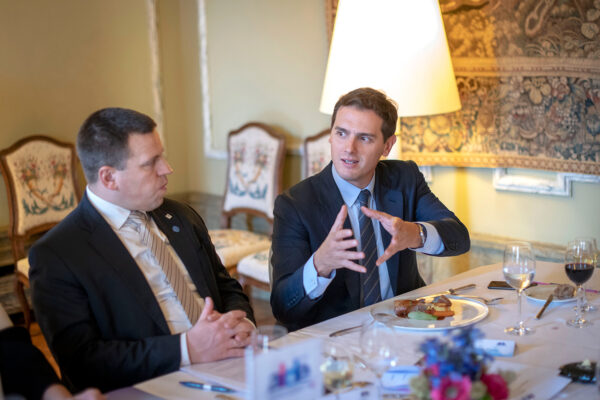
Spain’s liberal Citizens party needs to decide what it’s for: fighting the Catalan independence movement or liberalizing Spain?
The party clearly doesn’t know, which is causing it to go back and forth on possible coalition deals. Albert Rivera, the party leader, needs to make a choice and stick with it.
Deals with the left
After the inconclusive election of 2015, Rivera explored a coalition with the Socialist Party’s Pedro Sánchez. They failed when the two couldn’t get a majority.
When Sánchez was finally able to come to power a year ago with the support of the far left and Catalan pro-independence parties, Rivera promptly ruled out any more deals with him, arguing that the social democrat had sided with parties that want to break up Spain.
One of the reasons the Citizens were founded in Catalonia in 2006 was to resist the region’s then-burgeoning separatist movement.
Yet last week they said they were willing to team up with the Socialists again, at least at the regional level and under “exceptional” circumstances.
But not in Barcelona, where two left-wing candidates, Ada Colau and Ernest Maragall, shared first place in the municipal election and the Citizens and Socialists hold the balance of power.
Colau supports Catalan self-determination but not independence. Maragall leads the separatist Republican Left. Former French prime minister Manuel Valls, who heads a joint list with the Citizens in the Catalan capital, is willing to vote for Colau to keep Maragall out of power. Rivera disagrees, calling Colau an “independence-supporting populist”. No matter that her views on secession are ambivalent and that the only alternative to her is a man who clearly does support Catalan independence.
Deals with the right
Rivera’s indecision has been even worse in the case of the far-right party Vox.
Hoping to replace the conservative People’s Party as the largest party on the right, Rivera tied himself to Vox before the last general election. It didn’t work. The Citizens still placed third. Vox was the one that gained from the People’s Party’s implosion. (The party lost half its members of Congress.)
So the Citizens reversed themselves, ruling out more deals with Vox and opening the door to a deal with the Socialists. I welcomed the news, pointing out that aping the far right had not convinced conservative voters to stick with the mainstream parties and that Vox is an unreliable partner. In Andalusia, where it supports a regional government of the People’s Party and the Citizens, Vox is withholding its support from a budget because it wants additional spending cuts to historical memory, immigration and measures against gender violence.
But what does Rivera do this week? He opens the door to a deal with Vox again in order to form a right-wing government in the region of Madrid.
Make up your mind
Rivera needs to make up his mind.
If his priority is fighting the Catalan independence movement, his party should support Colau in Barcelona, do deals with Vox, which is virulently anti-Catalan, but not with the Socialists, who are willing to talk with the Catalan parties about transferring more power to the region.
If his priority is liberalizing Spain, the Citizens should not support Colau, who is left-wing; they should not do deals with Vox, which is Euroskeptic, socially conservative and protectionist; rather they should work with the Socialists, who are pro-EU, socially progressive and economically not that far from them.
My preference is for the latter. The Citizens could rein in the Socialists’ worst tax-and-spend instincts. The Socialists could temper the Citizens’ anti-Catalanism (and any agreement to stave off secession would require buy-in from unionist parties). Both parties want Spain to play a bigger role on the European stage and Politico reports that Madrid’s moment is now.
But Rivera’s words and actions suggest the former. If that’s the case, though, he needs to be more consistent.
